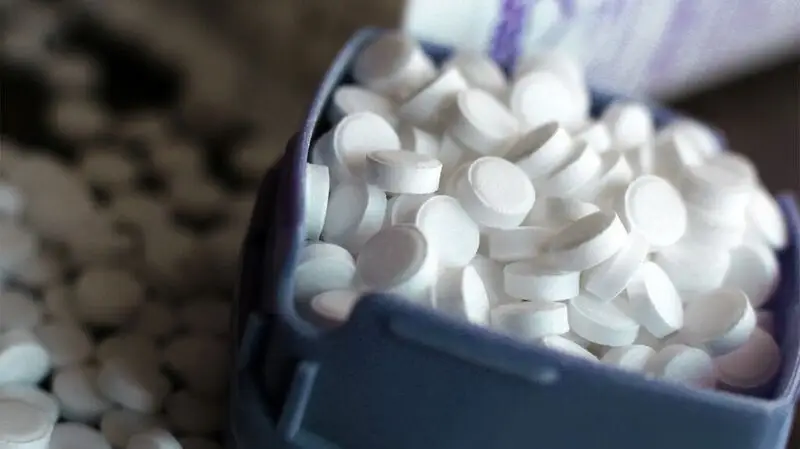
- Artificial sweeteners have long been used as a low-calorie alternative to sugar.
- Although most contain some calories, they are many times sweeter than sugar, so less is needed to give the same sweet taste in foods and drinks.
- Research has associated artificial sweeteners with a number of health conditions, including gastrointestinal problems, neurological symptoms, diabetes and cardiovascular disease.
- Now, a study has found that, in mice, aspartame triggers insulin spikes that lead to the build up of fatty plaques in the arteries — a risk factor for heart attacks and strokes.
Six artificial sweeteners have been approved by the FDA for food use — aspartame, saccharin, acesulfame potassium, sucralose, neotame, and advantame. As well as being used in sweet foods and drinks, they are found in many savory products, such as ready meals, ketchups and sauces, and even bread.
One of the most commonly used is aspartame, also known by its brand names, which include Nutrasweet®, Equal®, and Sugar Twin®. It is 200 times sweeter than sugar so, although it contains calories, much less is needed to give the same level of sweetness.
Research has suggested that artificial sweeteners may have adverse health effects, particularly if consumed often. They have been associated with several health conditions, including affecting the functioning of the gastrointestinal system, causing headaches and taste alteration, and increasing the risk of type 2 diabetes and
A new study investigating the effect of aspartame in mice has provided further evidence that it may contribute to CVD risk, and outlines how it might do this. The study found that aspartame triggered spikes in release of insulin — the hormone that controls blood glucose — leading to the build up of fatty plaques, or
The study is published inCell Metabolism.
“This study provides compelling evidence linking aspartame consumption to increased risk of atherosclerosis through an insulin-mediated inflammatory pathway. The findings are significant as they offer a mechanistic explanation for previous epidemiological studies that have observed higher rates of cardiovascular disease among people consuming artificial sweeteners.”
— Christopher Yi, MD, board certified vascular surgeon at MemorialCare Orange Coast Medical Center in Fountain Valley, CA, who was not involved in the study.
The researchers fed both male and female mice food containing 0.15% aspartame daily — the equivalent of a person drinking three cans (or about 1 litre) of diet soda a day — for 12 weeks.
They then compared these mice with a group that were fed a diet without aspartame, and a group fed a diet containing 15% sugar (sucrose).
Throughout the study, they continuously measured the mice’s insulin levels. They also assessed the health of their blood vessels at 4, 8 and 12 weeks.
Within 30 minutes of consuming aspartame, the mice’s insulin levels increased significantly. The researchers noted that this was not surprising, given that there are sweetness-detecting receptors lining the mouths, intestines, and other tissues of both mice and people.
These receptors help guide insulin release after sugar is eaten. Aspartame, being 200 times sweeter than sugar, seemed to trick the receptors into triggering much higher insulin release.
It was not only directly after aspartame consumption that insulin levels were raised. Mice on the aspartame diet had persistently high insulin levels, suggesting that long-term consumption of this artificial sweetener may lead to insulin resistance, which greatly increases the risk of type 2 diabetes.
“This research adds to growing concerns about the metabolic effects of artificial sweeteners. While they are often marketed as a healthier alternative to sugar, their impact on insulin dynamics and inflammation suggests otherwise.”
— Christopher Yi, MD
Insulin acts on many different cell types in the body, including muscle cells, adipose (fatty) tissue, liver, brain, and endothelial cells lining the blood vessels.
Yi told Medical News Today:
“The study supports the hypothesis that artificial sweeteners, particularly aspartame, may contribute to increased risk of CVD and type 2 diabetes. The data indicate that aspartame triggers insulin spikes via parasympathetic activation, leading to chronic hyperinsulinemia. This, in turn, upregulates CX3CL1, an immune signal that attracts inflammatory cells, exacerbating arterial plaque formation.”
After 4 weeks of the aspartame diet, the mice started to develop atherosclerotic plaques in their arteries, which increased by the 8 and 12-week point. In mice fed sucrose, the plaques did not develop until the 12-week point, although these mice did gain weight and fat.
Senior author Yihai Cao, who studies chronic diseases related to blood vessel disorders at Karolinska Institute in Sweden, told MNT that the discovery of CX3CL1 was unexpected, but might help the development of more effective drugs:
“Because [CX3CL1] is transmembrane protein, it will be locked on the endothelial cells lining in the inner layer of blood vessels. In this way, it can trap moving inflammatory cells in the blood.”
Yi explained why replacing sugar with artificial sweeteners might not decrease risk of metabolic disorders:
“This mechanism could explain why diet soda drinkers, despite avoiding sugar, still show a heightened risk for metabolic diseases. Chronic insulin elevation is a well-known risk factor for insulin resistance and type 2 diabetes, and the inflammatory response triggered by CX3CL1 may contribute to long-term cardiovascular damage.”
Cao said in a press release that he and his team plan to verify their findings in people. He emphasized the importance of knowing the long-term impact of artificial sweeteners, as they are found in so many foods and drinks.
Yi agreed.
“Given the study’s findings, it may be advisable for individuals—especially those at risk for cardiovascular disease or insulin resistance—to limit artificial sweetener consumption. While aspartame is FDA-approved and considered safe in moderation, these findings highlight the potential long-term risks associated with frequent intake.”
— Christopher Yi, MD
“Moreover, the study suggests that artificial sweeteners are not metabolically inert and can have profound effects on insulin regulation and inflammation. Until more human studies confirm these findings, adopting a balanced approach—favoring whole foods and minimizing artificial additives—seems prudent,” he advised.





